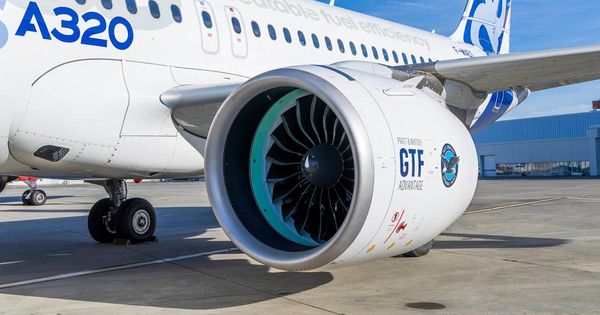In early 2024, the German government, in tandem with Deutsche Post, announced the end of all letter mail service being transported by airplane within the country. The policy, drafted in 2023, would require all Deutsche Post mail to omit any air travel in its supply change. The legislation was set out as a sustainability effort to circumvent the reliance on air transit and its high rate of carbon emissions. As a result, there will be an increased reliance on rail cargo transit. International letter mail can still be transported via air if needed.

In Germany, flights began to transit letter main starting in 1961, with an overall reliance remaining strong until the 1990s, when it has since dropped off. The main airline responsible for domestic mail transfer was Eurowings. Although domestic transit is phased out, Eurowings will use cargo space in some commercial flights to transfer mail internationally when applicable.
Previous laws required that letter mail be delivered to its final destination by the end of the following business day. This pressure will be subsided, as the new supply chain will make this a rather impossible task. Society's reliance on physical mail has dropped by over 85 percent. Email has replaced physical mail for many of the German government's official correspondences with residents.

The effort is set to reduce the carbon footprint of mail transit by over 80 percent. Within Germany, trains have since transitioned to greener forms of energy, with a limited reliance on fossil fuels. Electric trains and the growth of hybrid vehicles on the road have seen carbon emissions drop. In 2023, Germany reported having its lowest emissions in 70 years.
In 2024, sustainability has become the hottest topic across the aerospace industry. Different forms of sustainable fuel and studies into new engineering techniques have flooded headlines, while various companies are also trying internal changes to become carbon-free by 2050. Federal policies like the one for the Deutsche Post are prime examples of how government interference can construct meaningful change in the community when executed correctly.

Germany will be coal-free by 2038, as the government is shifting energy reliance to alternative sources. This change has not come with no protest, as the nation is undergoing a massive energy shortage due to over-dependence on natural gas, and fossil fuels from foreign markets continue to be phased out. Sanctions placed on Russia as a result of the invasion of Ukraine caused many natural gas and fossil fuel shortages in Northern and Western Europe. Projects such as the Nordstream 2 development have also highlighted a form of dependency. The German government looks to create independence from other energy sources by moving to alternative fuel sources.
Although the change has only recently occurred, this creates an initial shift in supply change operations. As it was once believed that speed was the main priority when shipping, this sustainability change shows that the populous is concerned more regarding environmental safety than personal conveniences. Airliners will have to speed up the development of SAFs if they want to continue being a part of the logistics operations moving forward.
Coloring the Clouds: How ANA Turned Airplanes into Art » Ryanair to Appeal $302 Million Italian Fine Over Alleged Travel Agency Restrictions » End of an Era: JetBlue's Farewell to the Embraer E190 »
Comments (0)
Add Your Comment
SHARE
TAGS
NEWS Sustainability Germany Deutsche Post Eurowings Cargo Sustainable Aviation Cargo FlightsRECENTLY PUBLISHED
 GlobalX Secures Rare Authorisation to Operate Intra-Canada Charter Flights
Global Crossing Airlines Group, Inc. (GlobalX) has achieved a significant regulatory milestone in its northern expansion strategy. The Canadian Transportation Agency (CTA) has officially granted the Miami-based operator authorisation to conduct intra-Canada charter flights, a permission rarely extended to U.S. carriers.
NEWS
READ MORE »
GlobalX Secures Rare Authorisation to Operate Intra-Canada Charter Flights
Global Crossing Airlines Group, Inc. (GlobalX) has achieved a significant regulatory milestone in its northern expansion strategy. The Canadian Transportation Agency (CTA) has officially granted the Miami-based operator authorisation to conduct intra-Canada charter flights, a permission rarely extended to U.S. carriers.
NEWS
READ MORE »
 GTF Storage Crisis Deepens: 835 Aircraft Grounded as Pratt & Whitney Recalls Surge Post-Mid-Year
The operational crisis surrounding the Pratt & Whitney Geared Turbofan (GTF) engine family has reached a new peak. As of late Q4 2025, the number of stored jets powered by the PW1000G family has climbed significantly, highlighting a widening gap between maintenance capacity and the relentless pace of engine recalls.
INFORMATIONAL
READ MORE »
GTF Storage Crisis Deepens: 835 Aircraft Grounded as Pratt & Whitney Recalls Surge Post-Mid-Year
The operational crisis surrounding the Pratt & Whitney Geared Turbofan (GTF) engine family has reached a new peak. As of late Q4 2025, the number of stored jets powered by the PW1000G family has climbed significantly, highlighting a widening gap between maintenance capacity and the relentless pace of engine recalls.
INFORMATIONAL
READ MORE »
 Ryanair to Appeal $302 Million Italian Fine Over Alleged Travel Agency Restrictions
Ryanair has announced its intention to challenge a €255.8 million ($302 million) fine imposed by Italy's competition authority, which accused the airline of obstructing travel agencies and online booking platforms from selling its flights.
NEWS
READ MORE »
Ryanair to Appeal $302 Million Italian Fine Over Alleged Travel Agency Restrictions
Ryanair has announced its intention to challenge a €255.8 million ($302 million) fine imposed by Italy's competition authority, which accused the airline of obstructing travel agencies and online booking platforms from selling its flights.
NEWS
READ MORE »



